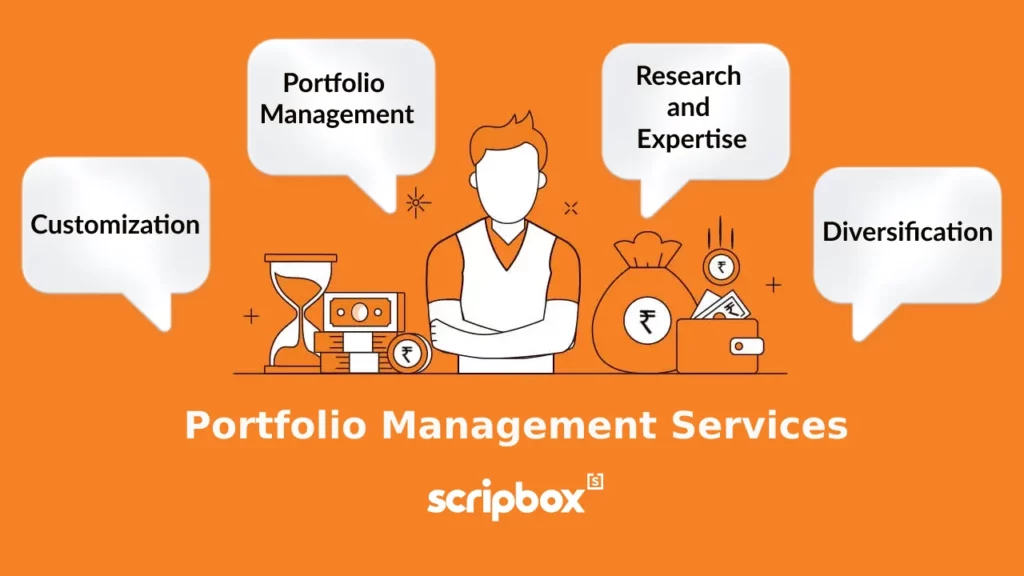Managing wealth isn’t just about picking stocks or investing in mutual funds. For high-net-worth individuals (HNIs), conventional investment products might be lacking in providing the flexibility and personalised strategies essential for wealth growth. Portfolio Management Services (PMS) deliver a customised, professional approach, ensuring that your investments are aligned with your financial objectives.
In this guide, we will discuss everything you need to know about PMS, including what it is, how it works, and most importantly, whether it’s the right fit for you.
What is Portfolio Management?
Portfolio management’s meaning can be understood as customised investment solutions designed for high-net-worth individuals who want professional management of their portfolios. Unlike mutual funds, which pool resources from multiple investors, a PMS provides customised strategies based on your unique financial objectives, risk appetite, and investment choices.
For instance, an HNI interested in generating regular income may have a PMS portfolio centered on dividend-paying stocks and bonds, while an investor with a growth orientation might prefer a portfolio that leans significantly towards high-growth stocks.
Whether your goal is long-term capital appreciation, risk protection, or income generation, a PMS can help you manage your money better.

What are the objectives of Portfolio Management?
1. Capital Appreciation: Aiming for long-term growth in portfolio value.
2. Risk Management: Adopting strategies to reduce potential losses and conform to the investor’s risk profile.
3. Income Generation: Developing a portfolio that provides periodic income in the form of dividends or interest payments.
4. Liquidity Management: Providing enough liquidity in the portfolio to meet the investor’s financial needs.
Types of Portfolio Management
PMS can be classified based on the level of control and decision-making authority:
1. Active Portfolio Management:
Active portfolio management requires a direct approach in which fund managers leverage both human expertise and algorithm-driven strategies to manage investment portfolios.
The managers rely on extensive research, individual judgment, and their forecasts of the market to determine what securities to buy, hold, or sell.
The main goal is to perform better than the market against a specific benchmark, such as the NIFTY 50.
2. Discretionary PMS:
Under Discretionary Portfolio Management Services, the portfolio manager has full discretion to make investment decisions on behalf of the client.
This means that they have the freedom to choose securities and enter or exit trades without any need for the investor’s approval in advance.
Discretionary PMS is usually best for investors who want a professional taking care of their investments efficiently or for those who may not have the time, knowledge, or desire to actively oversee their investment portfolios.
Because managers aren’t required to seek investor approval for each transaction, they can quickly respond to market opportunities.
3. Non-Discretionary PMS:
Under this PMS scheme, the portfolio manager acts as an advisor offering personalised investment recommendations.
These are best suited for investors who want expert advice while maintaining full control over investment decisions. The process can be slower, since every transaction needs investor approval before execution.
4. Advisory PMS:
Under this arrangement, portfolio managers offer recommendations based on the investor’s risk tolerance and goals. Ultimately, it is in the hands of the investor to decide whether to take any action on these suggestions or not, as they have full control over their investments.
As the portfolio manager does not carry out trades for the client, the investor bears sole responsibility for the timely and accurate execution of transactions.
This is the most appropriate for investors who prefer professional advice but want to carry out transactions independently.
Process of Portfolio Management
The PMS process involves some key steps:
Step 1: Defining Financial Goals & Risk Appetite
Consider an investor named Raj, who aims to build long-term wealth. His PMS provider begins by evaluating his financial goals – whether he seeks capital appreciation, consistent income, or a combination of the two – and assesses his risk tolerance.
Step 2: Choosing the Right Asset Mix
Depending on Raj’s goals, the portfolio manager selects an appropriate mix of asset classes. For instance, if Raj is growth-oriented, his portfolio could be largely composed of equities, while a conservative investor would prefer a high proportion of his investments in fixed-income instruments.
Step3. Picking Investments Within Each Asset Class
Now, within each asset class, the manager will carefully pick the securities. If Raj’s plan is geared towards growth, the manager might invest in mid-cap stocks, while a risk-averse investor might choose blue-chip stocks.
Step 4. Tracking Performance Regularly
The PMS team tracks the performance of the portfolio using advanced portfolio management software. If the market trends shift or Raj’s financial situation changes, they assess whether the portfolio still meets his objectives.
Step 5. Making Adjustments as Needed
Should economic conditions alter, such as an increase in interest rates or a sector performs poorly, Raj’s portfolio is adjusted as needed.
Step 6: Rebalancing to Stay on Track
As time passes, some investments perform better than others, which changes the original asset mix of the portfolio. To remain in line with Raj’s goals, the portfolio is rebalanced periodically to make sure that his risk and return expectations are consistent with his overall objectives.
Key elements of PMS process
- Portfolio Analysis
- Portfolio Planning
- Portfolio Execution
- Portfolio Monitoring
Portfolio Management Strategies
The Portfolio management process may be executed in several ways:
1. Growth Investing:
Focuses on stocks with high growth potential. Such stocks tend to do better during bull markets when the economy is rising and when investor confidence in the markets is high.
During times of economic uncertainty, these stocks can experience significant price movements since their valuations are largely based on anticipated future earnings of a company.
2. Value Investing:
Invests in underpriced stocks with strong fundamentals. Value stocks tend to do well in times of economic uncertainty since the investors favour stable, well-established businesses during such times. These companies, however, may underperform during strong bull markets when high-growth companies dominate investor interest.
3. Income Investing:
Invests in income-generating assets for regular or passive income. Income investing is particularly effective during uncertain market conditions, as investors seek reliable returns from dividends and bonds.
What are the benefits of investing in a PMS?
Investing in Portfolio Management Services could offer several advantages:
- Investments are tailored to your goals and risk appetite.
- Unlike mutual funds where the fund manager must stick to the fund’s mandate, PMS allows the manager to take tactical calls and adjust the portfolio dynamically to market conditions.
- Your portfolio is managed by professionals who use in-depth research and market information to make informed investment choices.
- It is SEBI-regulated, so there’s transparency and investor protection.
Who should opt for PMS?
Portfolio Management Services are well-suited for high-net-worth investors who are looking for customised investment solutions with professional expertise.
According to SEBI norms, a minimum investment of ₹50 lakh is mandated for the PMS in India. Investors who want direct ownership of securities with a tailored approach should consider PMS.
Conclusion
Portfolio Management Services provide a disciplined, professional method of wealth creation.
Although it offers tailor-made solutions for growth, income, and risk management, it has high charges and a long tenure. As an investor, you must weigh their financial goals, risk appetite, and the competence of the PMS provider before taking a call.
Thinking about investing in PMS? Let our experts help you make the right choice. Get in touch with Scripbox today.
PMS FAQs
PMS full form in banking stands for Portfolio Management Services.
As per SEBI regulations, the minimum investment required for Portfolio Management Services in India is ₹50 lakh.
No, investments in PMS are risky. Although fund managers apply professional strategies to maximise returns, fixed returns cannot be guaranteed.
PMS is best for high-net-worth individuals (HNIs) who are looking for personalised investment management, with direct holding of securities.
Explore other article related to PMS:











Show comments